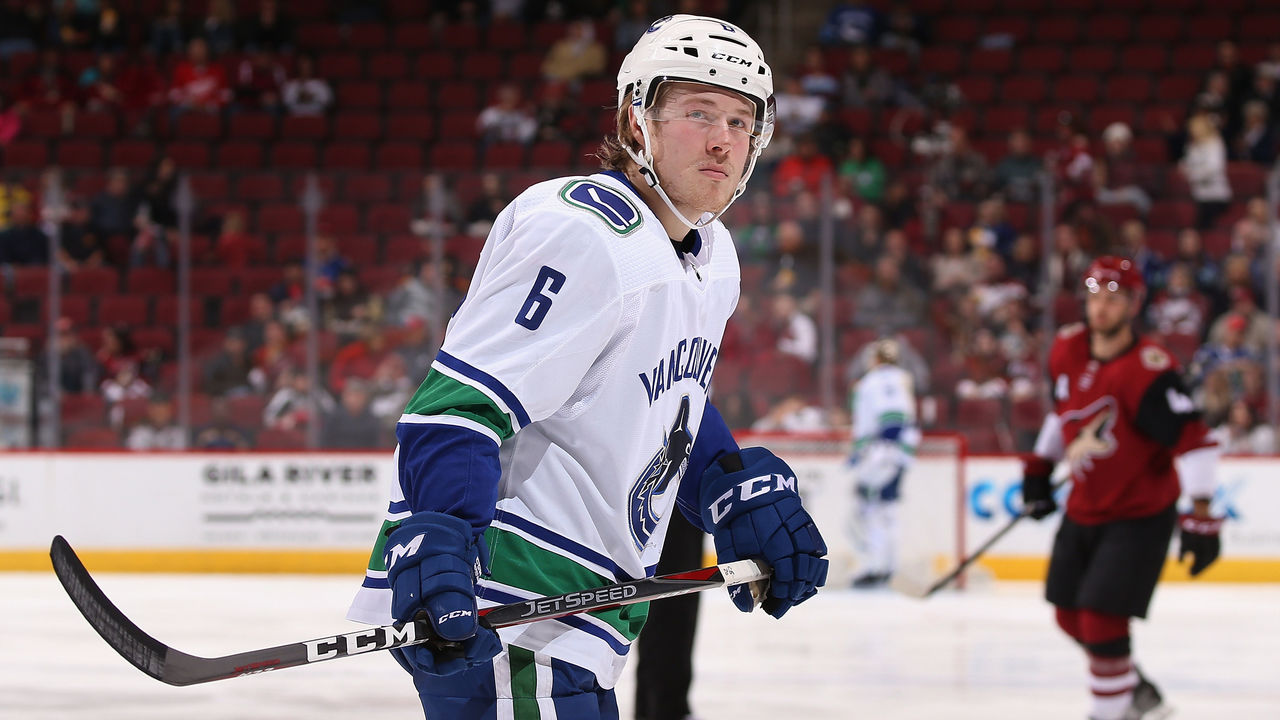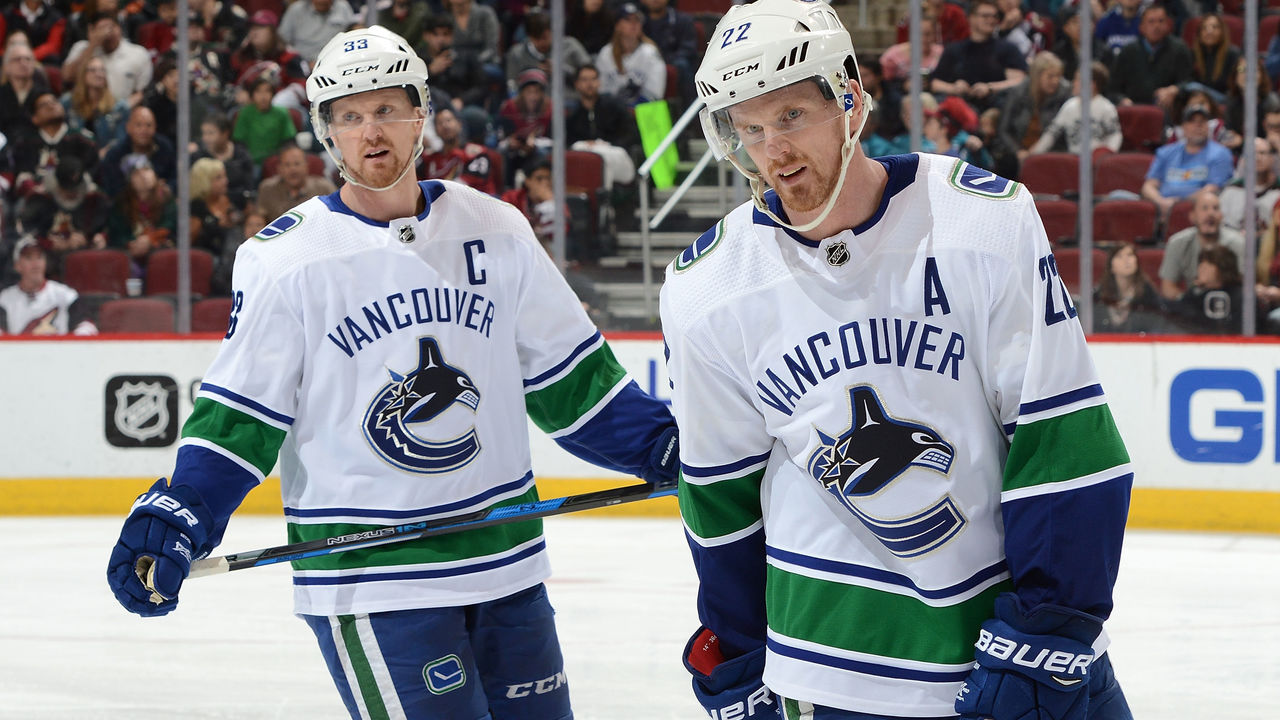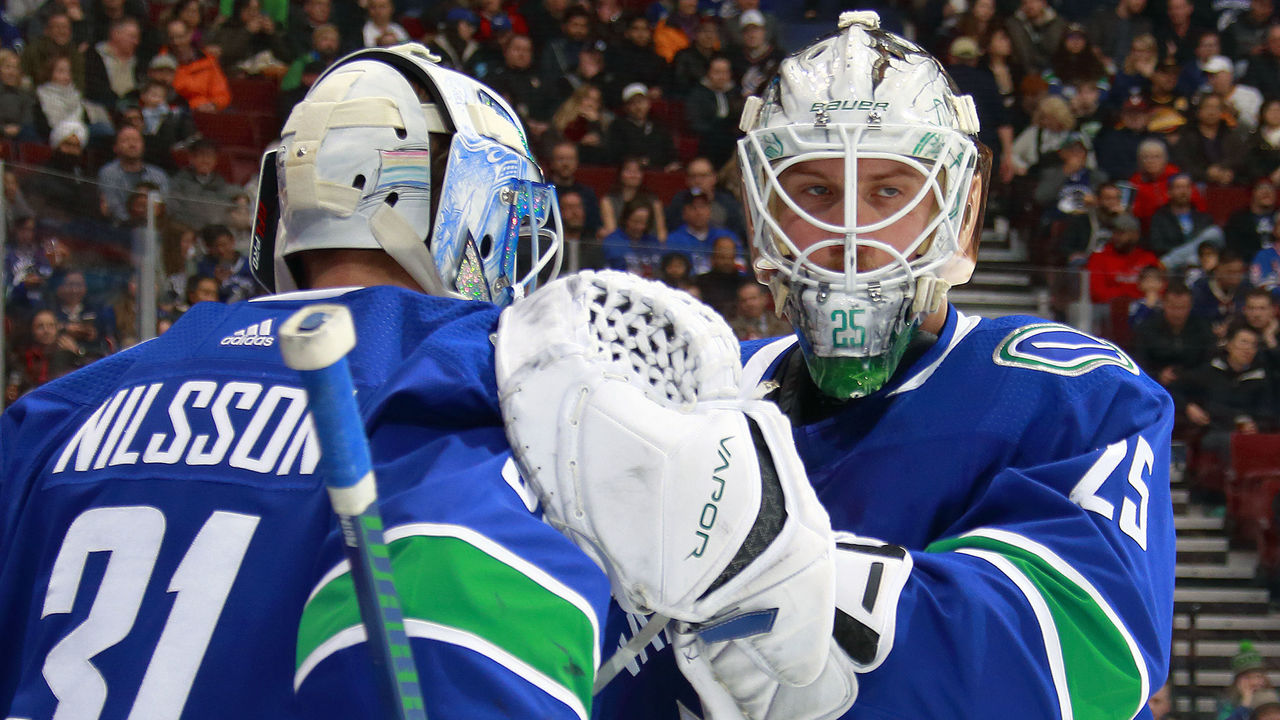Better Luck Next Year: Vancouver Canucks edition
As NHL teams are officially eliminated from Stanley Cup contention, theScore national sports editor James Bisson takes a look back at the highs and lows of their season, along with the biggest questions ahead of 2018-19. The first edition focuses on the Vancouver Canucks.
The Good

Brock Boeser's sensational season. Just about everything good that happened for the Canucks this season centered around Boeser, who was in the hunt for the Calder Trophy with 29 goals and 55 points through 62 games before suffering a season-ending back injury. The Islanders' Mathew Barzal should win the award, but Boeser is a deserving runner-up.
The 2015 first-round pick was particularly dangerous on the power play, racking up 10 man-advantage goals to ensure at least one area of Vancouver's special teams wasn't a total disaster. And with the Canucks potentially freeing up a pile of cash this summer (more on that later), don't be surprised to see them add some help for their 21-year-old phenom.
The first 10 games. It might be difficult for Canucks fans to look back this far, but the team actually got off to a great start with a 6-3-1 record through its opening 10 games. That stretch was punctuated by a 4-1-0 record on its five-game trip through Ottawa, Boston, Buffalo, Detroit, and Minnesota, with the only loss in that span coming at the hands of the Bruins.
Vancouver showed sensational goal-prevention skills in winning five out of six games overall, allowing two or fewer goals in all five of those victories. The goaltending tandem of Anders Nilsson and Jacob Markstrom looked virtually unbeatable. The good times didn't last long, but for at least the first 12.2 percent of the season, the Canucks looked like a playoff threat.
The power play. As deficient as the Canucks have been on offense, their power play actually ranks in the top half of the league as of Friday (20.9 percent). Vancouver has four players who have potted seven or more man-advantage goals as the season winds down, with Boeser joined by Daniel Sedin (eight), Bo Horvat (eight), and Sven Baertschi (seven).
The problem is that the Canucks' somewhat successful power play hasn't been able to mask a penalty kill that ranks 25th overall at 77.5 percent. That, and the fact that Vancouver has been thoroughly outplayed at five-on-five (minus-29 through Thursday's games). But Boeser's return should ensure the Canucks once again roll out a strong PP next season.
Horvat's step forward. Nearly every team has that one young player who divides the fan base - and it's fair to say Horvat was of the Canucks' most polarizing skaters in the past. But it's hard to deny that the hulking center, who turns 23 on April 5, has improved demonstrably in several areas, even if that betterment doesn't necessarily show up in his final scoring ledger.
Horvat is seeing a career high in ice time (19:17) and is making the most of it, increasing his faceoff success rate to 53.1 percent while also establishing career bests in Corsi For (49.2), Fenwick (48.4), and PDO (100.6). Add in the fact that he's a near-lock to return to the 20-goal plateau, and it's clear he's a player the Canucks can build around moving forward.
Brendan Leipsic's audition. It's impossible to know how Leipsic fits into the Canucks' long-term plans, but from what he has shown them so far, he could find himself as one of the team's key forwards in 2018-19. In addition to racking up six points over his first eight games with the club, he's playing an absurd 18 minutes per night - well above his 13-minute career average.
Leipsic has had a positive impact in limited time, the Canucks' remarkable recent scoring woes aside. And at an absolute bargain cost of $650,000 next season - he'll be an RFA in the summer of 2019 - his emergence will allow Vancouver to slot him in as a top-six forward without paying him like one. Look for Leipsic to be a popular guy in British Columbia next season.
The Bad

The Sedins' graceful decline. It's always difficult for a fan base to see its beloved skill players - particularly those who spend their entire career with that team - lose their effectiveness. And it's doubly disconcerting for Canucks supporters, who have had to watch the only two 1,000-point men in franchise history hit their decline at the same time.
Daniel has actually been slightly more efficient from a scoring perspective but is down to 15 minutes per game, his fewest since 2003-04. Henrik is headed for his first sub-50-point non-lockout showing since that same season. Unless they're willing to take a major discount, their time in Vancouver could be coming to an end. And if it is, they'll go out as they came in - quietly.
Disappointing defense. Vancouver's blue-liners have been a disaster, contributing significantly to the team's season-long goal-prevention struggles. And they haven't provided much at the offensive end, either. Only one defenseman - Michael Del Zotto (six) - has scored more than twice, and the unit has just 15 goals combined.
Vancouver has nearly $19 million tied up in its top-five salaried D-men next season, so look for a shake-up on the back end. It would behoove the Canucks to find someone who can produce offense from the blue line, and to consider moving at least one of their big-ticket defensemen out of town to make room for a blue-line prospect.
Sam Gagner's struggles. Gagner might never have lived up to his promise in seven seasons in Edmonton, but at least he was consistent, producing 10-18 goals and 37-49 points each season. The Canucks only wish he were that prolific this season, as he's on pace for a career low in goals and points in seasons where he played more than 55 games.
Playing for his fifth different team in the past five seasons, perhaps Gagner just can't get settled. And as hard as it is to believe, he's only 28. But with two more years and $6.3 million remaining on his contract, Vancouver needs to get more out of him on the offensive end. Or, perhaps they could trade him back to the Oilers - those guys could use a few more 40-point scorers.
Loui Eriksson's contract. This has officially become one of those things you just don't talk about with Canucks fans, unless you're craving a face punch. Signed to an inexplicably bad six-year, $36-million deal in 2016 that prevents him from being traded until 2020-21, Eriksson's return on investment has been, to say the least, minimal (21 goals, 23 assists in 115 games).
With the deal primarily made up of guaranteed money in the form of signing bonuses, a buyout isn't happening. And while he can hold his own on the defensive end, that contract is a poison pill for the Canucks for at least the next three seasons beyond this one. On the bright side, Eriksson's season-ending injury at the end of February spared him the fans' ire. For now.
Dreadful goaltending. The Canucks' dismal stretch of play that ran for more than a month in December and early January can't be pinned on one or two players - but some were more culpable than others. And the duo of Nilsson and Markstrom didn't do the team any favors over that stretch, each allowing more than their fair share of questionable goals.
The Canucks put together two four-game losing streaks and a five-game skid over that 15-game nightmare stretch - and Nilsson and Markstrom allowed at least three goals in all of those defeats. In fact, Vancouver surrendered five or more goals in seven of the 13 losses - and even surrendered three goals in one of the two wins over that span. It doesn't get much worse than that.
The Questions

Are the Sedins coming back? It's the biggest question of the offseason for the Canucks - and could completely alter the complexion of the team heading into 2018-19. The Sedins, for their part, haven't tipped their hand - but even if they do come back for what might be their final season, it should be at a much lower sticker price than the combined $14 million they made this year.
If the price tag is reasonable, there's no way the Canucks don't re-sign them; allowing them to hit the market would be horrible optics for the franchise. But if they do decide to retire, Vancouver would have enough cap space to take an immediate run at a less seasoned star player while retaining enough money to take care of their gaggle of talented young players.
What happens in net? Based on how Nilsson and Markstrom have performed this season, at least one of them won't be around in 2018-19. It'll be a lot easier for the Canucks to deal Nilsson, who has one year left on his contract at a reasonable $2.5 million cap hit. Markstrom is locked in for the next two seasons at nearly $3.7 million per year against the cap.
Thatcher Demko is having a terrific season with the Canucks' American Hockey League affiliate in Utica (20-10-6, 2.51 goals-against average, .920 save percentage) and should absolutely be given the opportunity to challenge for the No. 1 job. The 22-year-old could make an immediate impact for a team that desperately needs someone to stop the puck.
How do they handle their young players? Vancouver has some interesting decisions to make over the next two offseasons, with seven restricted free agents this summer and another six RFAs at the end of the 2018-19 campaign. Boeser's a slam dunk to be retained when his contract is up next year - but what will the Canucks do with the rest of their RFAs?
Baertschi is due a modest raise from the $1.85 million he made this season, while Markus Granlund, Derrick Pouliot, and Jake Virtanen should also see a slight boost. But with several other prospects coming up in the next two-to-three years, Vancouver won't be able to keep all of them. How they reshuffle the young guys will be an interesting offseason subplot.
Is it time for a free-agent splash? How the Canucks proceed this summer will depend on what happens with the Sedins - and for a team with precious little wiggle room at the moment, the salary relief will be huge. That said, fans shouldn't necessarily expect a major free-agent signing - not with a handful of raises to give out and most of the other big-ticket guys still under contract.
The Canucks have holes to fill at all three levels, but the organization will likely look to improve from within and at the draft rather than make it rain in free agency. And while that might come as a bit of a disappointment to fans, Vancouver clearly needs a long-term fix over a band-aid treatment - so there's more pain to come, the kind that can't be remedied through free agency.
Can the draft provide immediate help? The short answer here is yes - especially if the Canucks win the Rasmus Dahlin sweepstakes. Dahlin would provide an immediate upgrade to Vancouver's beleaguered blue line, giving them the offensive defenseman they need while allowing them to shuffle out one of their current top four for picks or prospects.
(Photos courtesy: Getty Images)